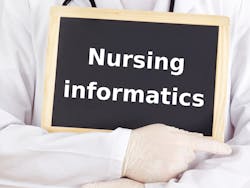What’s the Relationship Between Nurse Burnout and EHR Satisfaction?
Although physicians’ dissatisfaction with electronic health records (EHRs) is often attributed to higher levels of burnout, a new report from KLAS Research finds that there is just a slight, negative relationship between EHR satisfaction and nurse burnout, suggesting that as nurses become burned out, their EHR satisfaction declines. As the researchers pointed out, it’s important to note that the quantitative relationship is quite weak—only about 5 percent of the variation in an organization’s Net EHR Experience Score can be attributed to burnout rate.
As researchers from the Orem, Utah-based KLAS noted, though the firm’s Arch Collaborative’s primary focus is improving the EHR experience, the Arch Collaborative survey includes two questions about clinician burnout derived from the American Medical Association’s Mini Z study and correlated with the Maslach Burnout Inventory. “While analyzing nurse responses to these questions can yield interesting insights, this report is not a comprehensive analysis of the causes of burnout, nor are its recommendations intended to be the primary solutions for this complex problem,” they stated.
Nonetheless within the study, nearly 22,000 nurses were asked what are the largest contributors to burnout are. Nurse respondents to the Arch Collaborative survey most commonly cited a chaotic work environment, time-consuming bureaucratic tasks, and a lack of effective teamwork. A lack of shared values with organization leadership and working too many hours were the next most frequently cited factors.
Notably, EHR-related contributors were actually among the least frequently selected. This suggests that the EHR as a whole may not be a significant factor in nurse burnout, and organizations should focus most burnout-reduction efforts on other areas, according to the researchers.
Indeed, KLAS believes that a critical takeaway from the report was that the three standard responses that relate to the EHR (i.e., EHR or other IT tools hurt my efficiency, EHR or other IT tools inhibit my ability to deliver quality care, and lack of training/proficiency on EHR or other IT tools) were among the least commonly selected. Surprisingly, the researchers opined, lack of EHR training is the least frequently reported contributor to burnout. This supports the trend that nurse EHR satisfaction has a weak linear relationship with nurse burnout, they concluded.
What’s more, when nurse respondents are broken out by how long they have been practicing medicine, there is little variation (less than 10 percentage points) between the group that reports the highest burnout rate and the group that reports the lowest burnout rate. However, the researchers noted that newcomers and those with the most work experience are the least likely to be burned out. Those in the middle range (5 to 14 years and 15 to 24 years of clinical experience) are the most likely to be struggling.
Additionally, there is also little variation in nurse burnout rates between different types of organizations (e.g., children’s hospitals, academic health systems, or ambulatory care groups). In this case, the variation is less than 10 percentage points between the extremes, with nurses at children’s hospitals reporting the highest rates of burnout and nurses at ambulatory care groups experiencing the lowest rates.
The findings did reveal that nurses who work in the ED, perinatal departments, and the NICU are the most likely to be burned out. Comparatively, those working in behavioral health, infusion centers, and in administrative roles are least likely to be burned out.
Interestingly, the EHR vendor a nurse uses is the demographic metric with the highest variation in nurse burnout rates. There is a difference of almost 20 percentage points between the EHR customer base with the highest rate of burnout (Allscripts users) and the customer base with the lowest rate of burnout (eClinicalWorks users). “However, organizations should not interpret this variation as the defining factor in nurse burnout since the overall correlation between EHR satisfaction and nurse burnout is quite low,” according to researchers.


